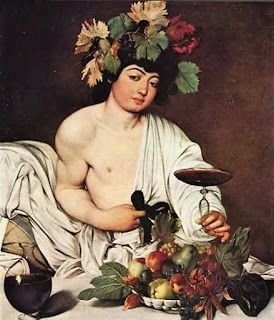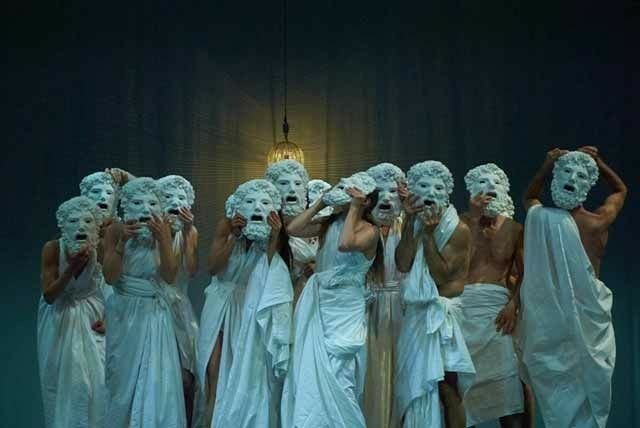
El teatro nació con la humanidad. Se puede considerar como las primeras expresiones teatrales: las danzas rituales de la prehistoria, los bailes colectivos, las ceremonias asociadas a las cosechas y a la caza. En ellas se usaban máscaras, maquillajes y otros recursos según su finalidad.
Pero el teatro, tal como se conoce actualmente, se originó en la antigua Grecia, aproximadamente en el año 600 A.C; lugar donde se organizaban fiestas en honor al dios Dionisio, dios de la vida y la alegría. En dichas fiestas los actores y el coro representaban leyendas épicas, famosas tragedias griegas. En ellas se contaban con mayores recursos de oratoria en escena y no tan tribales como en sus antecedentes históricos.
Se cree que el primero en hacer estos espectáculos fue Tespis, un poeta que iba de aldea en aldea con un escenario móvil provistos de ruedas, conocido como el carro de Tespis. El vestuario de los actores consistía en túnicas, capas bordadas, máscaras y unos zapatos muy altos llamados coturnos. El sitio donde representaban las obras se llamaba Theatron, que significa: Lugar desde el cual se mira. De allí el origen de su nombre.
Los romanos, unos siglos después, continuaron la tradición griega. Destacándose en la representación de obras muy alegres que recibieron el nombre de comedias
.
Muchas obras eran representaciones de temas religiosos, de misterio y milagros, durante la Edad Media y éstos se hacían en las iglesias; pero también existían teatros en las calles divirtiendo a las personas con poesías, canciones y las ocurrencias de los juglares, trovadores y bufones.
Durante el Renacimiento apareció William Shakespeare, uno de los grandes autores de teatro, con obras como: Romeo y Julieta, Hamlet y Otelo, Macbeth, entre otros. Manteniéndose las representaciones de sus obras hasta en la actualidad.
A mediados del siglo XVI, el teatro se convirtió en la comedia del arte de los arlequines, favoritos de los niños por sus acrobacias y graciosas pantomimas. En el siglo XVII escriben obras grandes autores como Lope de Vega, Tirso de Molina, Calderón de la Barca, Moliere... convirtiendo este período en el Siglo de Oro del teatro.
En épocas más recientes, el teatro pasó a ser experimental, absurdo, alternativo, político y muchos otros movimientos renovadores, abiertos e innovadores; según el tiempo que corre, tanto los guiones como las puestas en escenas se han ido profundizando y perfeccionando conforme lo que se quiera expresar en la obra.
Sin embargo a lo largo de la historia, el teatro se ha mantenido fiel a su origen, que no es más que el acto humano y sencillo de jugar a ser otro.
Theater and its history.
Theatre was born with humanity. It can be considered as the first theatrical expressions: prehistoric ritual dances, collective dances, ceremonies associated with harvests and hunting. In them, masks, makeup and other resources were used according to their purpose.
But the theater, as it is known today, originated in ancient Greece, approximately in the year 600 BC; place where parties were organized in honor of the god Dionysus, god of life and joy. In these parties the actors and the choir represented epic legends, famous Greek tragedies. They had greater resources for oratory on stage and were not as tribal as in their historical background.
It is believed that the first to make these shows was Thespis, a poet who went from village to village with a mobile stage provided with wheels, known as Thespis' chariot.The actors' costumes consisted of tunics, embroidered capes, masks and very high shoes called coturnos. The place where the theater plays were performed was called Theatron, which means: Place from which one looks. Hence the origin of its name.
The Romans, a few centuries later, continued the Greek tradition. Standing out in the representation of very happy theater plays that received the name of comedies
.Many theater plays were representations of religious themes, mystery and miracles, during the Middle Ages and these were made in churches; but there were also theaters in the streets entertaining people with poetry, songs and the occurrences of minstrels, troubadours and buffoons.
During the Renaissance, William Shakespeare appeared, one of the great playwrights, with theater plays such as: Romeo and Juliet, Hamlet and Othello, Macbeth, among others. The performances of his works were maintained even in today.
In the middle of the 16th century, the theater became the commedia art of the harlequins, children's favorites for their acrobatics and graceful pantomimes. In the 17th century, great authors such as Lope de Vega, Tirso de Molina, Calderón de la Barca, Moliere... wrote theater plays, making this period the Golden Age of theatre.
In more recent times, the theater became experimental, absurd, alternative, political and many other innovative, open movements; According to the times, both the scripts and the staging have been deepened and perfected according to what is wanted to be expressed in the theater plays.
However, throughout history, theater has remained faithful to its origin, which is nothing more than the simple human act of playing someone else.
The rewards earned on this comment will go directly to the person sharing the post on Twitter as long as they are registered with @poshtoken. Sign up at https://hiveposh.com.